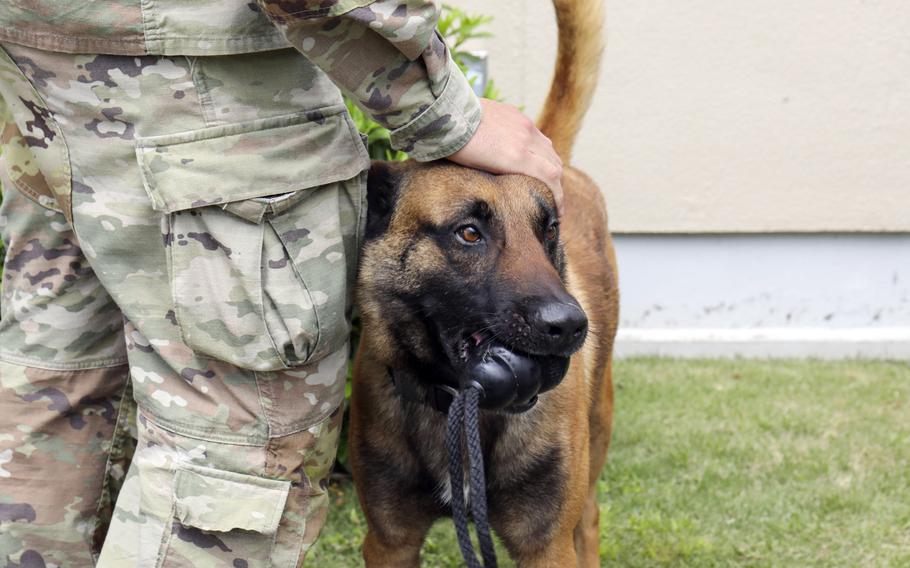
Yyonder is a Belgian Malinois with the 88th and 901st Military Police Detachments at Camp Zama, Japan. (U.S. Army)
TOKYO — A quick response by soldiers at the home of U.S. Army Japan saved the life of a military working dog suffering from heat stroke.
Yyonder, a Belgian Malinois with the 88th and 901st Military Police Detachments, showed signs of a heat-related illness while training April 8 at Camp Zama’s Dewey Park, according to a post on U.S. Army Garrison Japan’s official Facebook page.
The temperature that day was in the cool mid-60s, but Yyonder’s assistant handlers, Sgt. Malcolm Cabornay and Spc. Samiya Soutien, noticed the dog’s heavy, raspy breathing, veterinary assistant Spc. Donaven Murphy told Stars and Stripes by phone Tuesday.
“I was extremely nervous, as this was my first time having a military working dog emergency,” he said.
The dog was drooling, sluggish and unresponsive to commands, so Cabornay and Soutien quickly brought him to the K-9 vehicle, laid him in the trunk and vented air conditioning over him, Murphy said.
Cabornay said he knew the dog needed treatment right away.
“I was there trying to keep the situation calm and to quickly get the dog to the vet and assist them there,” he said in a separate phone interview Tuesday.
At the veterinary clinic, Yyonder had a temperature of 109 degrees, above the threshold that requires emergency treatment. He also had diarrhea and was vomiting, both symptoms of a heat-related illness.
The first solution was getting Yyonder on fluids to hydrate him.
“Initially, we definitely got everything done quickly and it is honestly what saved that dog’s life,” Murphy said.
Yyonder spent about a week at the clinic, where the veterinary staff and his handlers took turns staying with the dog to monitor him.
Yyonder returned to his kennel April 12 but required further monitoring, Murphy said. He may have an underlying condition that prevents his body from properly cooling, he said. Unable to perspire, dogs regulate body heat through their paw pads and by panting through their mouths.
Yyonder will fully recover but his handlers may need to move him to less strenuous duty, Murphy said.
Cabornay said Yyonder is in rehabilitation and would still work in detection. In December, he was named a distinguished honor graduate of the K9 Patrol Explosive Detector Dog-Enhanced Course, or PEDD-E, at Fort Leonard Wood, Mo.
Cabornay and the Zama veterinary staff, including Murphy, veterinarian Maj. Graciela Orantes and Sgt. 1st Class Kyle Trim, received thanks and a command coin from the garrison’s commander, Col. Marcus Hunter, who visited Yyonder at the clinic on April 8, according to the Facebook post.